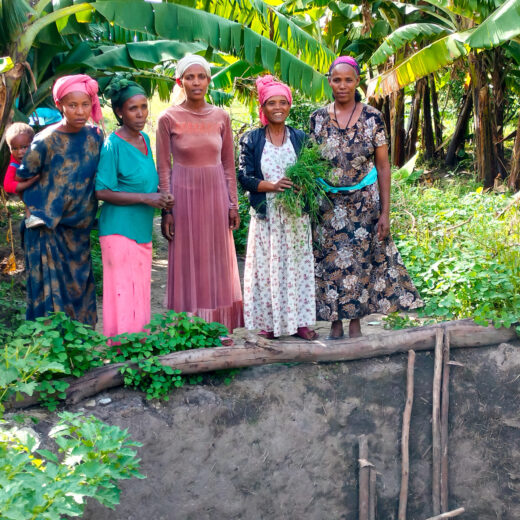Prefer to listen to this page?
An estimated 88% of Ethiopian children live in poverty. Not just financial insecurity, but a multi-dimensional poverty which includes lack of access to basic needs like housing, sanitation or education. In rural areas inequality runs deepest. The rural southern region of Ethiopia known as SNNPR is one of three regions where a staggering 91% of children live in poverty, compared to just 18% in the capital Addis Ababa.
What are the challenges in Ethiopia?
High rates of poverty mean that millions of children fail to complete education, dropping out of school early to help their families earn money, by labouring in the fields or selling goods on the streets. In rural areas, over 40% of children of school age may not be in the classroom. Literacy rates are therefore low, with as many as 48% of people aged over 15 unable to read and write.Citation Families rely on subsistence agriculture, but this is increasingly prone to climate shocks and stresses. As one of the most populous countries in Africa, there is also a growing problem of land shortages for farming families in rural areas like the SNNPR.
What is Global Care doing about poverty in Ethiopia?
Working with our long-standing Ethiopian partners, the Ethiopian Addis Kidan Baptist Church Development Commission, we supported a programme in three villages in Koshe, in one of the poorest districts in the SNNPR. Using self help groups as a catalyst for change, our partners brought together 225 women to build skills, knowledge, confidence and supportive relationships, before using microfinance to help develop business opportunities. We expanded the project to include a further 10 self-help groups in Shashemene.

The self-help groups project has now finished, and it succeeded beyond our expectations. It led to successful businesses for many women. Being able to cover their families’ needs, they no longer needed their children to work. Education became an attractive opportunity that they now had the capacity to invest in. But it went further than that…
Entrepreneurial change
A group of 10 women decided to take their businesses further. Initially they sold vegetables purchased from a wholesaler. They soon realised they’d make more profit if they grew their own crops, so they pooled their profits to rent a piece of land.
Then they made a decision which really sent their business soaring, clubbing together to dig a well and install a pump, to irrigate the land.
Climate change has made rainfall uncertain in places like Ethiopia, threatening food production for the many women farmers in rural Ethiopia. When a crop fails due to a lack of rain, women farmers have no food to sell and no food for their families. However, there is plenty of water underground. It’s difficult and expensive to get to – but, with the right well and pump, crops are more reliable, better quality and more frequent. Instead of 1 or 2 uncertain harvests, women farmers can produce 3 or 4 reliable harvests.
Seeing the success of this entrepreneurial group of women inspired our Wells for Women project.
Change family prospects to change a child’s future
Funded through our 2024 Christmas appeal and a grant from Guernsey Overseas Aid Commission, we’re in the process of digging 13 wells. Each well will serve 10 impoverished women farmers and their families, hugely increasing the income potential for each of those families.
“This has been a really exciting project. We’ve seen incredible success where women have had the opportunity to work together to build a better future for themselves and their families.
In light of this success, our partners were keen to extend this opportunity to women in other local communities. By providing them with the infrastructure and training needed to successfully grow and sell produce together, they are giving the women the tools they need to achieve financial security – and financial security means regular meals, consistent education and better health for their children.”
Steve Wicking, Head of Operations
For communities in Ethiopia, poverty becomes a huge barrier to education. By providing families with the skills and resources they need to lift themselves out of poverty, children are released from income generating tasks. They’re able to go to school, learn and grow – and break the cycle of poverty for their generation.
Support more grassroots initiatives like this
Our Wells for Women Farmers project is fully funded, thanks to people like you.
There are so many opportunities like this one in Ethiopia where seed funding for a grassroots initiative can dramatically impact a community’s prospects – and turn around the lives of vulnerable children. If you want to be a part of change like this, consider becoming a Children at Risk Change-Maker. The ripple effects from projects like this is felt through generations.
Our Children at Risk fund is used to begin grassroots initiatives just like this one, and is also there when a child needs emergency medical treatment or a community faces a crisis. With the minimum donation being just £3 per month – less than a cup of coffee – it’s the perfect way to give a little yet have a massive impact.
I want to help

 “This has been a really exciting project. We’ve seen incredible success where women have had the opportunity to work together to build a better future for themselves and their families.
“This has been a really exciting project. We’ve seen incredible success where women have had the opportunity to work together to build a better future for themselves and their families.